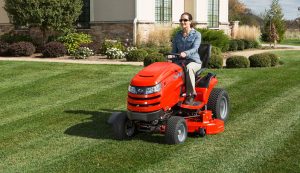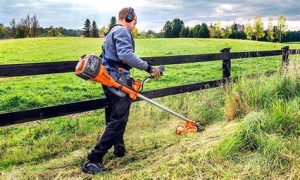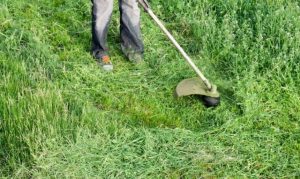8 Causes of Excessive Engine Heat in a Cub Cadet Lawnmower
You can tell the engine on your lawnmower is getting heated. If this happens, you shouldn’t keep mowing the lawn. To avoid doing serious damage to the engine, you should pull over and address the issue immediately.
If you’re using the incorrect engine oil, the engine oil level is too low, the cooling fins are blocked, the air filter is clogged, or the engine guard isn’t properly installed, your Cub Cadet mower’s engine could overheat.
A clogged mower deck, worn blades, or pushing the mower too quickly for long, thick, or wet grass can all cause the Cub Cadet engine to overheat.
Read and abide by the Cub Cadet operator’s manual’s instructions for safe use. In order to troubleshoot and repair a lawnmower, you must first turn off the engine, take out the key, let the engine cool, and then remove the spark plug wires.
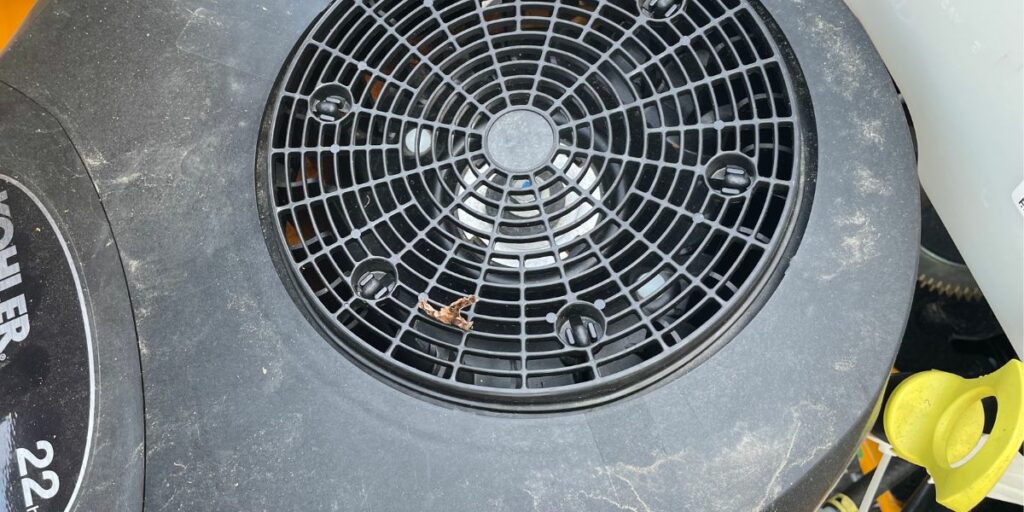
Table of Contents
Exactly what causes your Cub Cadet lawn mower to overheat?
Incorrect Cub Cadet Mower Engine Oil Use
Cub Cadets’ engines benefit from being lubricated with oil since it helps them maintain a consistent operating temperature. Different motor oils have different properties. Oil for an air-cooled tiny engine is not the same as oil for a liquid-cooled engine.
Air-cooled engine oil with a high zinc content is used in Cub Cadet small engines. The addition zinc functions as a refrigerant.
Due to the usage of liquid water for engine cooling, conventional motor oils do not contain very much zinc.
Below is a table detailing the ideal oil to use at various temperatures. Use this table in addition to the manufacturer’s oil suggestion found in your owner’s manual.
To get the best performance out of the engine on your Cub Cadet lawn mower, most experts advise using SAE30 or 10W-30 engine oil. However, when working in warmer temps, you may need to switch to 20W-50 oil.
The ANSWER is to change the oil in the engine from the improper type to one designed for use in air-cooled engines.
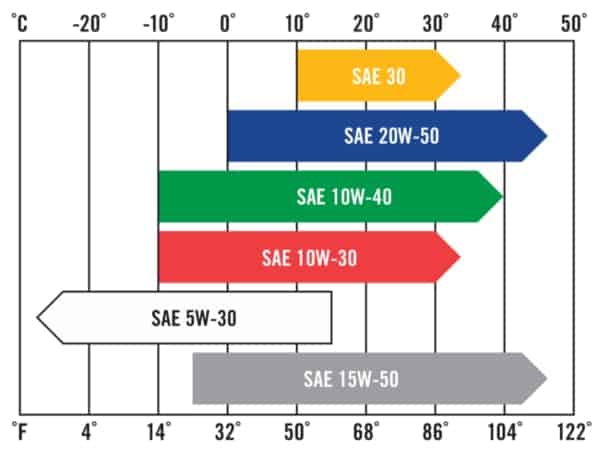
Cub Cadet Lawnmower with Low Engine Oil
To ensure smooth motion of the engine’s internal components, regular lubrication is essential. Low oil levels cause friction, which in turn generates heat in the engine.
If you keep an engine running with a low oil level, the oil will thicken. Significant engine damage can result from this.
Before you start the mower, you should make sure the engine oil is at the proper level. If the oil level is low, you should top it off.
If the oil level in the Cub Cadet is always low, check for the following:
- Leaking Oil – Inspect the engine compartment for oil leaks. Once the source of the leak has been located, the leaking gaskets should be replaced. If your mower has a filter, you should check it, too. Check the oil filter’s seal and replace it if necessary.
- Oil flames out? It could be a clogged air filter. If the air filter is clogged, engine oil will be wasted and the engine will have to work harder. Unless it’s too filthy to clean, the air filter is something that can be cleaned or replaced.
- In extreme cases of engine overheating, oil must be replaced. An issue with the valves or rings could potentially be the cause. Take your mower in for an engine checkup as soon as possible.
The solution is to check the oil level and top it out if necessary. If you suspect dirty oil as the source of your engine’s unpleasant odor, a comprehensive oil change should be performed immediately. A thickening oil could have been the result of heating.
If difficulties persist after you’ve changed the oil, the Cub Cadet’s engine may have been severely damaged by lack of oil.
If you need help fixing your lawnmower, visit a Cub Cadet dealer who specializes in servicing or an engine dealer. The technician has to do more tests to identify the full scope of the problem.
Damaged or obstructed engine cooling fins on a Cub Cadet lawn mower
The function of the engine cooling fins is to direct airflow away from the interior of the cylinder head and engine block, where the heat may be dissipated.
- An engine fan sits atop the unit. It draws in cool air from outside and directs it downward into the engine.
- Heated air is evacuated from the bottom of the engine after being routed through all of its hot components.
A failure to flow enough air around the engine might occur if the cooling fins become clogged with dirt or are broken. Overheating of the engine is a potential risk.
To fix this, take off the top of the engine and clean the radiator fins. You need to replace any broken fins you find. Clean up the area surrounding the engine and the cover.
In the future, this should be a regular element of your upkeep.
Washing the engine of your Cub Cadet might make the problem worse by forcing water and dirt into the workings of the engine. Avoid making a bad situation more worse by spraying water into the engine while washing your lawn mower.
The Cub Cadet Lawnmower Is Missing Its Engine Guard
If you want to preserve your engine from overheating, you need to make sure the engine shield is in place so that cool air can flow around it. A lack of a guard causes the area’s cool air to leak out.
Make sure the engine guard is in its proper location. Screws holding the shield in place should be tightened or replaced. Substitute a new guard for an old one.
Unable to Mow Due to Clogged Cub Cadet Lawnmower Air Filter
To prevent dirt from affecting engine wear, the air filter is utilized to filter the air entering the engine.
If the filter isn’t regularly maintained and cleaned, dirt and debris might build up and prevent air from reaching the engine.
The Cub Cadet engine may overheat if it has to work harder to vent the excess heat.
ANSWER: Take out the filter and look at it. Put the paper piece under a flashlight beam. If there is sufficient illumination and the filter appears to be in good shape, remove the dirt and replace it.
In contrast, if the illumination is poor or nonexistent, the air filter is damaged, or if it appears very dirty and dark in color, a new filter must be installed.
Some Cub Cadet mower engines have what’s termed an inner air filter and pre-filter, which consists of a thin filter housed inside a larger paper air filter in a canister design. A foam pre-cleaner can be used by some, which is wrapped around a traditional paper air filter.
These filters provide extra defense for the motor by capturing debris and keeping it out of the engine’s air intake system.
Maintaining a healthy mower requires regular maintenance, including replacing the air filter once a year and wiping it down numerous times over the mowing season.
If you use your Cub Cadet in dusty conditions or mow your lawn more frequently than the average homeowner, you may need to replace or clean it more frequently.
If you want the air filter to last as long as possible without breaking the bank, avoid being stingy. In spite of my frugal nature, I regularly shell out cash for necessary upkeep products.
Changing the air filter is much more cost-effective than repairing or replacing the engine because of junk entering the engine cavity.
Cub Cadet Lawnmower with a Cluttered Deck
The deck of your Cub Cadet mower needs to be scraped clean on a regular basis to prevent the accumulation of debris like grass clippings and dirt.
This accumulation lessens the space under the deck, which is used to generate air flow for a clean shave. The engine has to work harder to turn the blades as they pass through the dust and dirt.
Use a deck scraper to remove debris from the mower’s deck. A putty knife or wire brush might also do the trick.
Maintaining a clean mower deck requires regular inspections.
There are treatments available to cover the underneath of the mower deck, which can aid in preventing accumulation. Although these items may help, you can still expect some accumulation despite their use.
Cutting damp grass and not using the mower at full power will help prevent clumping and buildup under the deck.
Subpar Cub Cadet Mower Blades
A clogged mower deck is already a major inconvenience; dull mower blades will only make matters worse.
Cutting through junk under the deck requires more effort from the engine, which can be further taxed by turning dull blades. This might cause the engine to overheat.
Mower blades need to be sharpened and inspected frequently. Mower blades need to be sharpened at least twice a season, or every 25 hours of use, for the average household.
The Cub Cadet Engine Was Being Overworked
In order to get the most out of your Cub Cadet, it’s important to take stock of your mowing conditions.
The engine may be overworked if you try to cut grass that is too long, too thick, or too damp. It could overheat if you do this.
The solution is to reduce the ground speed of the mower when cutting long, thick, or damp grass. To ease the strain on the motor and get a clean shave, use these strategies:
- It’s best to wait until the grass has dried up before cutting it.
- Long grass should be trimmed twice or three times. The highest possible height for the mower deck must be selected. Perform the initial incision. The next step is to make another cut when the deck is somewhat lower.
- Put the mower’s engine through its paces at top speed.
- When mowing tall, thick, or damp grass, slow down.
After you’re done mowing the lawn, give your Cub Cadet’s engine some time to cool down.
It is essential to let the engine cool after using a Cub Cadet lawn mower before putting it away.
Mowers from Cub Cadet are designed to be used outside. You can see the engine of your Cub Cadet riding mower by simply lifting the hood.
The mower should be allowed to run with no additional weight. Your engine will begin to cool down through typical engine cooling processes.
More about: “Lawn Mower Engine Cooling Times Explained“.
Is Your Cub Cadet Mower Still Giving You Trouble?
I’ve compiled a list of the most frequently encountered issues with Cub Cadets and how to fix them in case these solutions didn’t work for you. Frequent Issues with Cub Cadets.
Find out why your Cub Cadet is having problems like it won’t start, won’t cut properly, vibrates too much, or even starts smoking. I provide answers and resources for further study.
